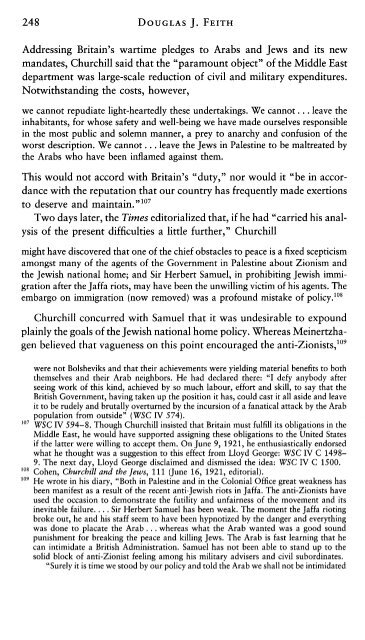Churchill, Palestine and Zionism, 1904-1922 - Douglas J. Feith
Churchill, Palestine and Zionism, 1904-1922 - Douglas J. Feith
Churchill, Palestine and Zionism, 1904-1922 - Douglas J. Feith
Create successful ePaper yourself
Turn your PDF publications into a flip-book with our unique Google optimized e-Paper software.
248 DOUGLAS J. FEITH<br />
Addressing Britain's wartime pledges to Arabs <strong>and</strong> Jews <strong>and</strong> its new<br />
m<strong>and</strong>ates, <strong>Churchill</strong> said that the "paramount object" of the Middle East<br />
department was large-scale reduction of civil <strong>and</strong> military expenditures.<br />
Notwithst<strong>and</strong>ing the costs, however,<br />
we cannot repudiate light-heartedly these undertakings. We cannot ... leave the<br />
inhabitants, for whose safety <strong>and</strong> well-being we have made ourselves responsible<br />
in the most public <strong>and</strong> solemn manner, a prey to anarchy <strong>and</strong> confusion of the<br />
worst description. We cannot ... leave the Jews in <strong>Palestine</strong> to be maltreated by<br />
the Arabs who have been inflamed against them.<br />
This would not accord with Britain's "duty," nor would it "be in accordance<br />
with the reputation that our country has frequently made exertions<br />
to deserve <strong>and</strong> maintain." 107<br />
Two days later, the Times editorialized that, if he had "carried his analysis<br />
of the present difficulties a little further," <strong>Churchill</strong><br />
might have discovered that one of the chief obstacles to peace is a fixed scepticism<br />
amongst many of the agents of the Government in <strong>Palestine</strong> about <strong>Zionism</strong> <strong>and</strong><br />
the Jewish national home; <strong>and</strong> Sir Herbert Samuel, in prohibiting Jewish immigration<br />
after the Jaffa riots, may have been the unwilling victim of his agents. The<br />
embargo on immigration (now removed) was a profound mistake of policy.loS<br />
<strong>Churchill</strong> concurred with Samuel that it was undesirable to expound<br />
plainly the goals of the Jewish national home policy. Whereas Meinertzhagen<br />
believed that vagueness on this point encouraged the anti-Zionists,I09<br />
were not Bolsheviks <strong>and</strong> that their achievements were yielding material benefits to both<br />
themselves <strong>and</strong> their Arab neighbors. He had declared there: "I defy anybody after<br />
seeing work of this kind, achieved by so much labour, effort <strong>and</strong> skill, to say that the<br />
British Government, having taken up the position it has, could cast it all aside <strong>and</strong> leave<br />
it to be rudely <strong>and</strong> brutally overturned by the incursion of a fanatical attack by the Arab<br />
population from outside" (WSC IV 574).<br />
107 WSC IV 594-8. Though <strong>Churchill</strong> insisted that Britain must fulfill its obligations in the<br />
Middle East, he would have supported assigning these obligations to the United States<br />
if the latter were willing to accept them. On June 9, 1921, he enthusiastically endorsed<br />
what he thought was a suggestion to this effect from Lloyd George: WSC IV C 1498-<br />
9. The next day, Lloyd George disclaimed <strong>and</strong> dismissed the idea: WSC IV C 1500.<br />
108 Cohen, <strong>Churchill</strong> <strong>and</strong> the Jews, 111 (June 16, 1921, editorial).<br />
109 He wrote in his diary, "Both in <strong>Palestine</strong> <strong>and</strong> in the Colonial Office great weakness has<br />
been manifest as a result of the recent anti-Jewish riots in Jaffa. The anti-Zionists have<br />
used the occasion to demonstrate the futility <strong>and</strong> unfairness of the movement <strong>and</strong> its<br />
inevitable failure .... Sir Herbert Samuel has been weak. The moment the Jaffa rioting<br />
broke out, he <strong>and</strong> his staff seem to have been hypnotized by the danger <strong>and</strong> everything<br />
was done to placate the Arab ... whereas what the Arab wanted was a good sound<br />
punishment for breaking the peace <strong>and</strong> killing Jews. The Arab is fast learning that he<br />
can intimidate a British Administration. Samuel has not been able to st<strong>and</strong> up to the<br />
solid block of anti-Zionist feeling among his military advisers <strong>and</strong> civil subordinates.<br />
"Surely it is time we stood by our policy <strong>and</strong> told the Arab we shall not be intimidated


